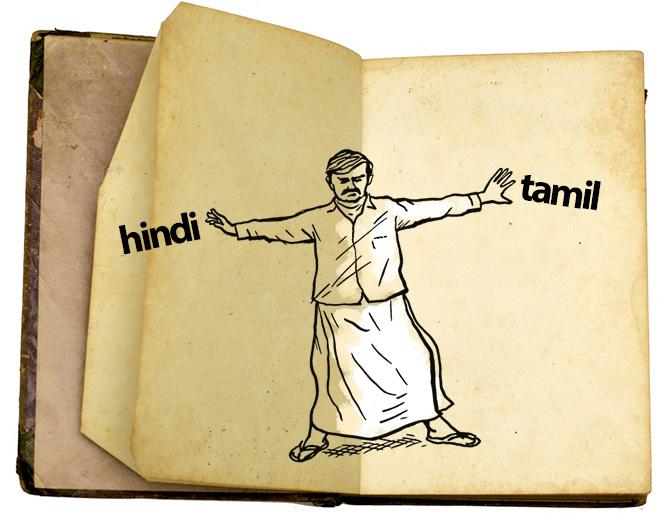'We are not opposed to any Indian language. We are against Hindi imposition.'

The kerfuffle between the Union and Tamil Nadu governments over the New Education Policy -- specifically the compulsory teaching of Hindi as third language in state board schools -- shows no sign of abating, or resolution.
Since the anti-Hindi agitation of the 1960s, Tamil Nadu has followed a two-language formula in its schools.
The National Democratic Alliance government would like the state to adopt the three-language formula but the state has remained steadfast in its refusal to do so. In Tamil Nadu, while the rival All India Anna Dravida Munnetra Kazhagam remains opposed to Hindi being imposed, the Congress has maintained a silence while the BJP has gone all out in favour of the move.
As the standoff continues, T K S Elangovan, a senior DMK leader and a former MP, tells A Ganesh Nadar why the state opposes Hindi imposition even as it is not opposed to speaking or learning Hindi.
The NEP proposes three languages but it doesn't specify that the third language has to be Hindi. So why are you making it an anti-Hindi agitation?
We are not making it an anti-Hindi agitation.
They earlier said that Hindi should be taught in every state. Education is in the Concurrent List and there is a law in our state that we will follow a two-language formula in education and administration and if we abide by that law, they are threatening us that they will not give us money. What kind of threat is this?
The Government of India should share its funds with the states equally or as per rules they have framed. They cannot say we will not give you funds. That is what they are saying. It is unconstitutional.
Don't you think the anti-Hindi agitation belongs to the 1960s and has run out of steam now?
No, it started way back in 1938 when the Justice Party lost the elections and the Congress came to power. Rajaji (C Rajagopalachari) became the chief minister and he said that Hindi should be taught in all schools. The agitation started at that time and then it was stopped.
In 1952 it started again when Rajaji became the chief minister in democratic India. It reached its peak in 1965 when students immolated themselves protesting against Hindi imposition.
The people of Tamil Nadu have always been against Hindi imposition.
In 1968 a law was enacted in the assembly that Tamil Nadu will follow a two-language policy and that law is still in force, we are only following that law. In 1980 and even now we are not denying any student's right to study any language.
There is a Hindi Prachar Sabha in Chennai teaching Hindi, we are not stopping them.
There is an Alliance Francaise which is teaching French, the German embassy is teaching German and the Russian Council is teaching Russian.
We are not stopping anybody. They are not in our education system and this order doesn't apply to them.
There are two education streams in Tamil Nadu. The Central Board which is CBSE and the state board which is SSE. In the CBSE system they are teaching Hindi and we are not stopping them but in our board we are following the two-language formula.
Today you can effectively live in Chennai without being able to speak in Tamil. Service providers like auto drivers, vegetable vendors all know a smattering of Hindi with which they converse with non-Tamil customers. Given this, isn't the anti-Hindi agitation ineffective?
No, there are people from North India working here because they could not get employment there. They are doing menial work here. They are driving autos. They are not educated people.
The North Indian states are not giving good education also. Their people are serving in hotels, cleaning tables. They can speak Hindi and that does not mean they have learnt Hindi and come here. That is their mother tongue and we respect their mother tongue.
Their failure to give employment to their people and education to their people and skills to their people has led to this.

Are you opposed to speaking Hindi itself, or opposed to Hindi imposition?
We are not opposed to any Indian language. We are against Hindi imposition. Don't compel us to study Hindi, that is our stand, it is our choice.
We have our education in Tamil and great educationists the world over have said that studying in your mother tongue is the best education possible.
We are successful. We are second or third in the country in the field of education. Our students who have studied here are in better positions than their North Indian counterparts.
Can you define what you mean by Hindi imposition?
Hindi imposition means you are compelled to study it.
But isn't Hindi a tool for economic progress? People see it advantageous to them to improve their business or work opportunities, so why are you opposing it?
Our people are working in other states in higher positions. They are not doing menial labour and cleaning tables. They get better positions in bigger companies because of their education.
There proper education was not given, here we give proper education.
The dropout rate in Tamil Nadu is much less than in any other state in the country. People study here and pass and go on for higher studies. They go to other states and get good positions.
Even our IAS officers who have studied here work there. They learn Hindi and speak with the locals, they manage very well.
That doesn't mean everyone has to learn Hindi and go to work in Uttar Pradesh and Madhya Pradesh or Rajasthan. Those people don't have any job there and so they are coming here.
Home Minister Amit Shah has said no state will lose seats because of delimitation, so aren't you creating a fear psychosis when you insist that it will happen?
Let the government say that there will be no increase in seats in Parliament.
You mean, decrease in seats?
I mean increase, as they plan to increase the Lok Sabha seats to 848.
As per our calculation UP will get 63 seats more. All North Indian Hindi-speaking seats will get 150 seats more. And Tamil Nadu will get only 10 seats more. So it is about increase, not decrease.
In 1967 we had 41 seats and in 1971 we lost two seats because we had followed sincerely the Government of India's family planning scheme. But none of the North Indian states is following family planning, a Government of India scheme, and nobody asks them.
If the Union government is not releasing funds why don't you approach the courts instead of discussing it in public?
We will first take it to the people of Tamil Nadu so that they know how the Union government is cheating them.
We will go to court. That route is always there but we need the people to know.
In all areas the funds to Tamil Nadu is reduced. We pay more by way of tax but we get less by way of our share.
- Part 2 of the Interview: 'We Started Our Party For 90% Of Hindus'











 © 2025
© 2025